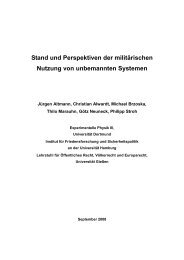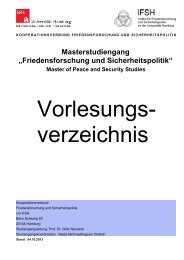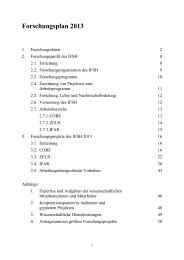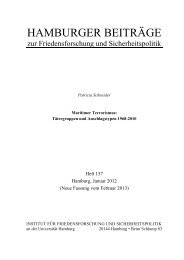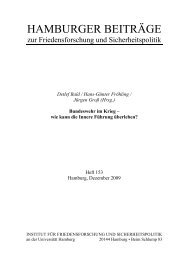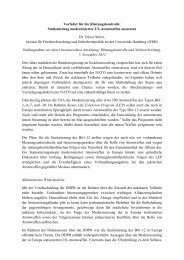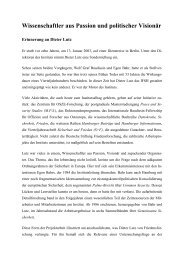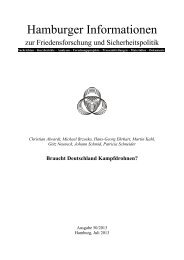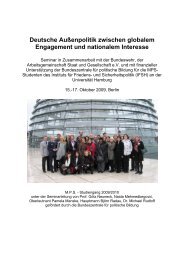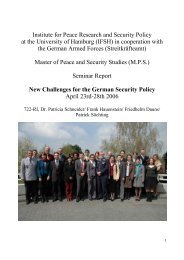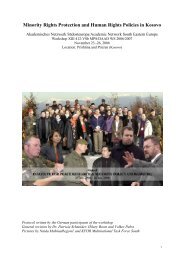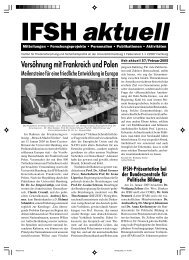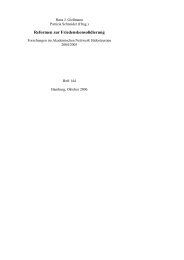Download | PDF - IFSH
Download | PDF - IFSH
Download | PDF - IFSH
Sie wollen auch ein ePaper? Erhöhen Sie die Reichweite Ihrer Titel.
YUMPU macht aus Druck-PDFs automatisch weboptimierte ePaper, die Google liebt.
Ilire Agimi<br />
A Review of Governmental Contributions to Reconciliation among Albanians<br />
and Serbs in Kosovo: Possibilities for Coexistence<br />
1. Introduction<br />
The aftermath of any violent conflict usually presents one of the toughest challenges to deal with,<br />
for both, for society and for state institutions. Whereas the majority of the Balkan countries have<br />
recovered from the chain wars in the 1990’s and the integration into a multi-ethnic European future<br />
is becoming a reality, Kosovo 1 still has a long way to go until the former enemy communities accept<br />
each other as equal citizens. This is where the concept of ‘reconciliation’ comes into function.<br />
Reconciliation involves the difficult process of rebuilding (or creating) a relationship between estranged<br />
communities with the aim of providing opportunities for the development of a joint future. 2<br />
I agree with Wolfgang Petritsch, who says that reconciliation is “a complex web of economic, social<br />
and political elements interwoven with ‘soft’ issues like truth, trust, tolerance and empathy.” 3<br />
As the analysis on Kosovo will show, it is important to recognize that only when reconciliation is<br />
incorporated as an essential part of the complex politically led transformation process will it be<br />
possible for the society to recover from a violent and divided past. With the vast changes undergone<br />
since the beginning of the war seven years ago, the case of Kosovo provides the necessary<br />
elements to exemplify the difficulties a society faces when recovering from violent conflict, such as<br />
democratization of institutions, refugee return, social integration through education etc. This research<br />
describes these difficulties and tries to answer the following question: To what degree do the<br />
efforts governmental institutions are investing in order to create new conditions for this recovery<br />
include measures for achieving reconciliation?<br />
2. Reconciliation for Realists<br />
Reconciliation, truth telling, and justice are fundamentally political processes. 4 An exceptional<br />
analysis of reconciliation from Susan Dwyer sheds more light on the fragile circumstances and<br />
complex issues a society endures after a violent conflict. She argues that the solution to these issues<br />
by political measures paves the way for national reconciliation. 5 Despite her very brief engagement<br />
with the debate on reconciliation, Dwyer’s approach had nevertheless a substantial impact on it,<br />
especially by emphasizing the importance of the political aspect within this process and trying to<br />
limit the importance given to forgiveness. 6 According to Dwyer, “reconciliation does not require<br />
apology or forgiveness” 7 . Dwyer argues that it is useful to “distinguish between micro-level and<br />
macro-level reconciliation, where the former typically involves local, face-to-face interactions and<br />
the latter concerns more global interactions between groups of persons, or nations which are often<br />
mediated by proxy” 8 . The fundamental point for Dwyer’s ‘realistic’ approach is that “national reconciliation<br />
can be successful even if individual reconciliation with the past doesn’t happen” 9 . At<br />
this macro level the political capability and authority of governing institutions can be exercised to<br />
encourage and guide the population to reach what is best for itself. “Reconciliation at a macro level<br />
requires the credibility that can be established only by the implementation of social and economic<br />
1<br />
In the thesis I refer to the whole society of Kosovo with the term ‘Kosovar’ whereas the two main ethnic groups<br />
analysed are referred to with the terms: ‘Kosovo Serb’ and ‘Kosovo Albanian’.<br />
2<br />
Compare with: Dudouet et al, p. 25 (2005).<br />
3<br />
Petritsch (2003).<br />
4<br />
Compare with: Barsalou, pp. 1-12 (2005).<br />
5<br />
Dwyer’s ‘realistic’ concept is used to describe pragmatic governmental efforts. Her concept opposes accepting<br />
reconciliation solely as a spiritual, emotional or religious concept. Compare with: Dwyer, pp. 91-110 (2003).<br />
6<br />
Compare with: Dwyer, op.cit., p. 102.<br />
7 Dwyer, op.cit., p. 105.<br />
8 Dwyer, op.cit., p. 93.<br />
9 Ibid.<br />
35



